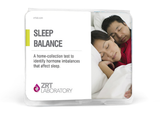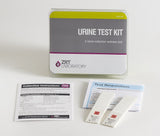LCMS Urine Diurnal Hormones Profile (UDH I) Sleep Balance Profile Testin Dried Urine Spot (DUS) is a diagnostic tool that measures specific hormones and biomarkers related to sleep quality and circadian rhythm. The Sleep Balance Profile Test accurately measures the following 16 hormones:
- Melatonin Metabolite 6 Sulfatoxymelatonin (MT6s4) x 4 times a day.
- Free Cortisol (FCx4) 4 Times a day,
- Free Cortisone (FCnx4) 4 Times a day
- Creatinine ( Crtnx4)
Test Result: You will receive your test result 3-5 working days after the laboratory receives your sample. You will see your hormone levels in graphics and numbers on your test results. In the comments, you will also see laboratory comments by Hormone Specialist PhD Dr: you will find Dr analysis of your hormone levels and what to do next.
Test Method:
Mass spectrometry (LCMS)– utilizes different sample preparations to measure analytes, or fragments of analytes, via a mass/charge ratio. Gold standard for high sensitivity/specificity, extended linear range, and complex hormone analysis. Slow adoption due to cost of instrumentation and need for highly trained staff.
Key Features
- Sleep Quality Assessment: The Sleep Balance Profile Test provides insights into various aspects of sleep quality, including the measurement of melatonin, a hormone involved in regulating the sleep-wake cycle. By assessing melatonin levels, the test helps evaluate the effectiveness of the body's natural sleep-inducing mechanisms.
- Sleep Disorder Identification: The Sleep Balance Profile Test aids in identifying potential underlying causes of sleep disorders such as insomnia, delayed sleep phase syndrome, and circadian rhythm disorders. By evaluating hormone levels and circadian rhythm markers, it helps pinpoint specific dysfunctions that may contribute to sleep disturbances.
- Hormonal Evaluation: The Sleep Balance Profile Test measures the levels of key hormones involved in sleep regulation, including melatonin, cortisol, and cortisone. These hormones play a crucial role in the sleep-wake cycle, circadian rhythm, and overall sleep quality.
- Dried Urine Spot (DUS) Collection: The test utilises dried urine spot collection, which offers convenience and ease of use. Dried urine samples can be collected at home, making it a convenient option for individuals to monitor their sleep-related hormone levels.
- Melatonin Assessment: Melatonin is a hormone produced by the pineal gland that regulates the sleep-wake cycle. This test evaluates melatonin levels, providing insights into the body's natural production of this sleep hormone.
- Cortisol and Cortisone Measurement: Cortisol and cortisone are stress hormones that can impact sleep quality. The test assesses these hormone levels, helping to identify any imbalances that may contribute to sleep disturbances.
- Circadian Rhythm Evaluation: The Sleep Balance Profile Test provides information about the body's circadian rhythm, which is crucial for maintaining a healthy sleep pattern. Evaluating the levels of melatonin and cortisol in relation to the individual's sleep-wake cycle helps to assess the synchronisation between hormones and sleep patterns.
- Comprehensive Sleep Assessment: By examining multiple hormone levels involved in sleep regulation, the Sleep Balance Profile Test offers a comprehensive evaluation of sleep health. It provides a more complete picture of the hormonal factors that may be influencing an individual's sleep quality and patterns.
- Treatment Monitoring: The Sleep Balance Profile Test can be utilized to monitor the effectiveness of interventions and treatment plans for sleep-related issues. By retesting hormone levels and circadian markers, healthcare professionals can assess progress and make adjustments to the treatment approach as needed.
- Personalised Treatment Approach: The test results can help healthcare professionals develop personalised treatment plans for individuals experiencing sleep disturbances. By identifying hormone imbalances, healthcare providers can recommend targeted interventions, including lifestyle modifications, dietary changes, and supplementation, to optimise sleep health.
- Click to see Sleep Balance Sample Report
- Collect samples from the comfort of your home and post them to our lab.
- The test is suitable for both adults and children
- The test must be used within 12 months after the purchase date.
- The test kit includes a laboratory fee: no additional laboratory cost or tax.
- Customers are responsible for shipping their samples to the laboratory.
The Test Kit pack includes
- Test Requisition Form includes Symptom Checklist
- Requisition Form to complete, including your personal and medical history
- Contains collection instructions
- Sample Cards for collecting a dried urine sample
- Instructions on How to Use Collection Kit
- Return Envelope
- Shipping instruction
Are You Familiar With Following Questions?
People who have difficulty sleeping may have various questions related to their insomnia or sleep disturbances. Here are some common questions that individuals with sleep issues may ask:
- Why am I having trouble falling asleep?
- What could be causing my frequent waking during the night?
- How can I improve the quality of my sleep?
- Are there any lifestyle changes I can make to promote better sleep?
- What are some effective strategies for managing racing thoughts or an overactive mind at night?
- Is it normal to feel anxious or stressed before bed, and how can I reduce these feelings?
- Are there any natural remedies or supplements that may help me sleep better?
- When should I seek professional help for my sleep problems?
- What is the recommended amount of sleep for someone my age, and how can I ensure I'm getting enough?
- Can certain medications or medical conditions affect my sleep?
- How can I establish a consistent sleep schedule and routine?
- What are some relaxation techniques or practices I can try before bed to promote sleep?
- Are there any underlying sleep disorders that I should be aware of and get evaluated for?
- How can I address and overcome insomnia or sleep anxiety?
It's important to note that sleep concerns can be complex, and individual experiences may vary. Our Sleep Balance Test Kit might answer your questions. After receiving your test result, we recommend consulting with a healthcare professional, such as a sleep specialist or doctor, can provide personalised advice and guidance based on an individual's specific sleep difficulties.
Advantages of Sleep Balance Profile Test
Here are some potential benefits of the Sleep Balance Test in dried urine spot:
- No more 2:00 am wake-ups-more accurate results
- Measures hormones at 4-time points
- Provide a true 24-hour sleep-wake pattern
- No jug urine collection. Collect your sample through Dried Urine Spot Sample Card and post it to our lab.
- Assessment of hormone levels: The test can provide insights into hormone imbalances that may be affecting sleep patterns, such as cortisol (stress hormone), melatonin (sleep-regulating hormone), and other hormones involved in the sleep-wake cycle.
- Evaluation of circadian rhythm: The test can assess the timing and balance of hormone secretion throughout the day and night, providing information about circadian rhythm disruptions or irregularities.
- Personalised treatment approach: The results of the test can help healthcare providers tailor treatment plans based on individual hormone profiles. This may include hormone replacement therapy, lifestyle modifications, or targeted interventions to address specific imbalances.
- Identification of underlying causes: The Sleep Balance Test can help identify potential underlying causes of sleep disturbances, such as hormonal imbalances, chronic stress, or disruptions in the body's natural sleep-wake cycle.
- Monitoring treatment progress: For individuals undergoing hormone therapy or other interventions to improve sleep quality, the Sleep Balance Test can be used to track changes in hormone levels over time and assess the effectiveness of the treatment.
- Improved sleep management: By gaining a better understanding of hormone imbalances and circadian rhythm disruptions, individuals can make informed decisions about sleep hygiene, lifestyle adjustments, and potential interventions to optimise their sleep patterns.
Losing Sleep? It Could Be Hormones
Lack of sleep, also known as sleep deprivation, can manifest with various symptoms. Here are some common symptoms associated with insufficient sleep:
- Fatigue: Feeling excessively tired and lacking energy throughout the day.
- Daytime sleepiness: Experiencing a strong urge to sleep or dozing off during waking hours.
- Difficulty concentrating: Finding it challenging to stay focused, pay attention, and retain information.
- Poor memory: Having difficulties with recalling details or events.
- Irritability: Feeling easily agitated, short-tempered, or more prone to mood swings.
- Mood changes: Experiencing changes in mood, such as increased irritability, anxiety, or depression.
- Reduced motivation: Experiencing a decline in enthusiasm or lack of drive to engage in activities.
- Impaired judgment: Making poor decisions or having difficulty assessing risks accurately.
- Increased appetite: Feeling hungrier than usual, especially craving high-calorie, sugary foods.
- Weakened immune function: Having a higher susceptibility to illnesses and infections.
- Reduced libido: Experiencing a decrease in sexual desire or interest.
- Headaches: Developing frequent headaches or migraines.
- Muscle aches and weakness: Experiencing muscle fatigue, weakness, or general discomfort.
- Blurred vision: Having temporary vision problems or difficulty focusing on objects.
- Increased risk of accidents: Being more prone to accidents or errors due to impaired cognitive functioning and slower reaction times.
- Can’t get to sleep or stay asleep in the night,
- Frequent or early waking,
- Weight gain.
It's important to note that the effects of sleep deprivation can vary from person to person, and some individuals may experience additional or different symptoms. If two or more of these symptoms persist, Sleep Balance testing can identify whether it’s a hormonal imbalance. Simple testing can release whether your hormones are the hidden barrier to your restful sleep.
Hidden Barriers to Restful Sleep
Due to life and work lifestyles, many people suffer from some degree of insomnia; it’s surprising that many are still unaware of the connection between hormones and sleep. Several hormones are key to the sleep-wake cycle, and an imbalance of these levels can sabotage slumber night after a sleepless night.
Hormones & Your Sleep
Many adults are losing sleep because of stress – the constant companion of modern life. Cortisol is the hormone released by our bodies in response to stress, and chronically elevated levels are known to impair our ability to sleep. Additionally, the gradual decline in the production of the sleep hormone melatonin as we age triggers imbalances directly related to sleep.
Understanding The Sleep - Wake Cycle.
In a perfect world, the master stress hormone cortisol should be in sync with the master sleep hormone melatonin. Each hormone counter-balances the other in a precise rhythm – when cortisol is high, melatonin should be low, and when melatonin is high, cortisol should be low. When this balance is upset, we find ourselves longing for sleep that never comes.
The Downside of Chronic Sleep Loss
The benefits of adequate sleep cannot be overstated. According to the Department of Health & Human Services, over a third of adults report daytime sleepiness so severe it interferes with work, decision making and social functioning. In fact, depression, obesity and diabetes are just three of the long-term consequences of sleep deprivation – defined as six or fewer hours per night.







